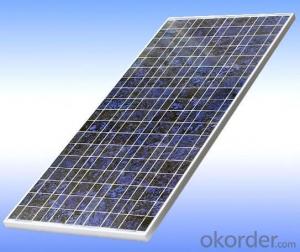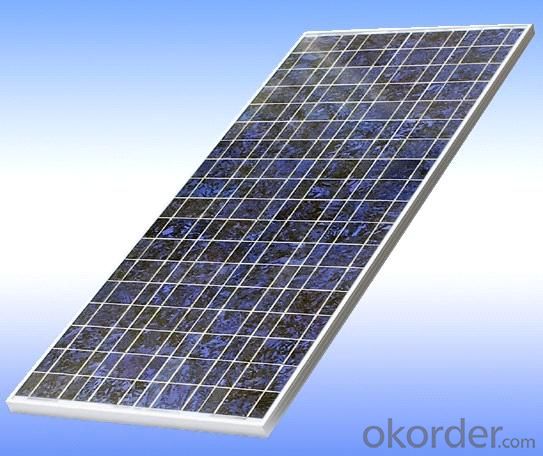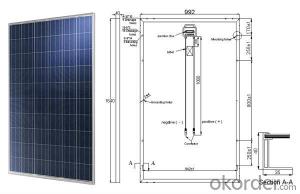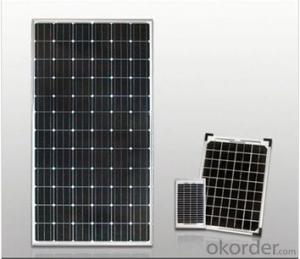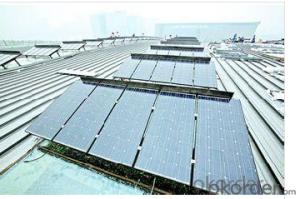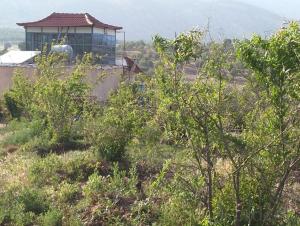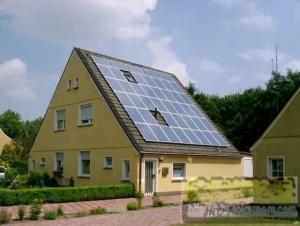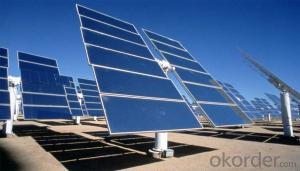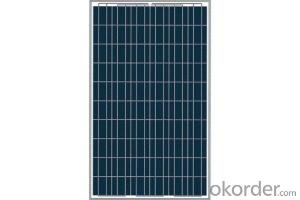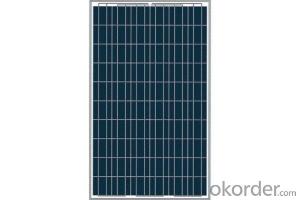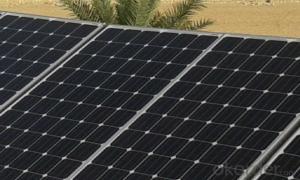Connect Solar Panels:UL and TUV Approved High Efficiency 70W Mono Solar Panel
- Loading Port:
- Shanghai
- Payment Terms:
- TT OR LC
- Min Order Qty:
- 10000 watt
- Supply Capability:
- 20000000 watt/month
OKorder Service Pledge
OKorder Financial Service
You Might Also Like
Specification
1.The Description of Product
Nowadays, with the shortage of the energy sources, people start to develop the solar energy, a new long lasting sources of energy which can be used almost anywhere. Why solar energy become so popular, we summarized the below some advantages of solar energy.
Type | CNBM Solar Polycrystalline Series |
Materials | Silicon |
Guarantee | 12 yrs free from defects in materials and workmanship No less than 90% within 10yrs and no less than 80% within 25yrs TUV(IEC61215&IEC61730), CE, UL |
Application | Photovoltaic/ solar/ green energy/ energy saving |
Descriptions | 1.High efficiency crystalline silicon solar cell. Even if under the weak light, the solar module can produce maximum power output. 2.Tempered glass (toughened glass): Anti-reflecting coating and high transmission rate glass increase the power output and mechanical strength of solar module. 3. EVA and TPT: Using high quality EVA and TPT to prevent destroying and water. 4. AI frame: Without screw, rner connection. 6 holes on the frame can be installed easily. 5. Junction box: Multi function junction box with water proof. 6. Long lifetime: ≥25 years; Less power decrease. 7. Good performance of preventing from atrocious weather such as wind and hails. 8. Resisting moisture and etching effectively, not effected by geology. 9. The certificate issued by international authority: UL, TUV, IEC, CE.
|
2.Production Line
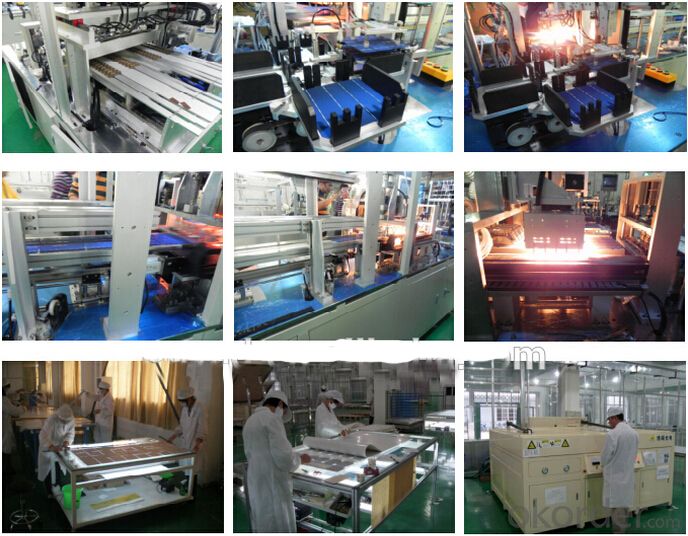
3.The Pictures of Solar Panels
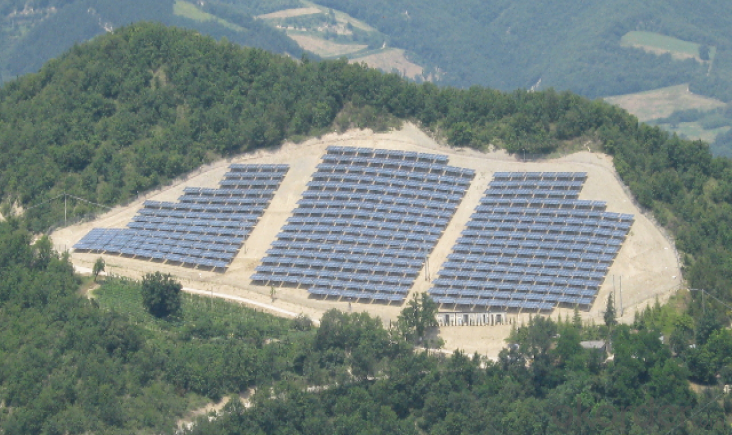
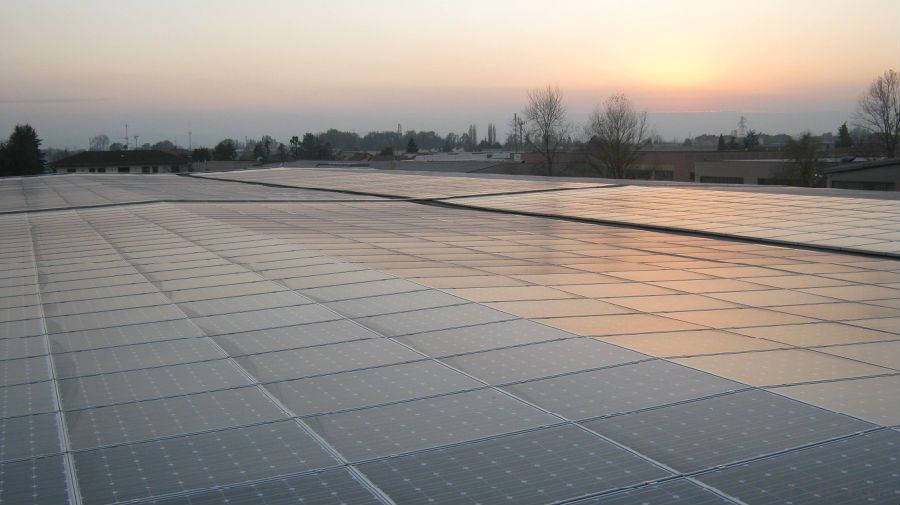
4.Packing
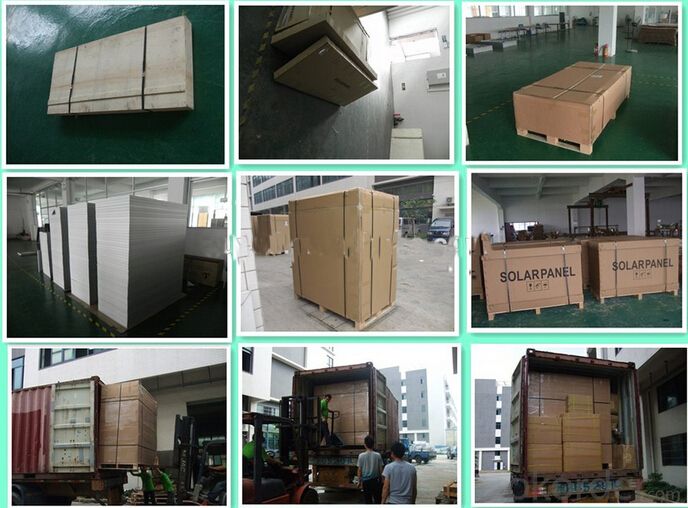
5.FAQ
1). How to buy?
Contact with the talking button.
2).Can you do OEM for us?
Yes, we can.
3). How long can we receive the product after purchase?
In the purchase of product within three working days, We will arrange the factory delivery as soon as possible. The perfect time of receiving is related to the state and position of customers. Commonly 7 to 10 working days can be served.
4). Can we visit your factory?
Sure, welcome at any time is believing.
- Q: Can solar panels be used in space?
- Yes, solar panels can be used in space. In fact, they are extensively used in space missions to generate electricity from sunlight, as there is no atmosphere to block or scatter the sunlight in space. The International Space Station and various satellites rely on solar panels to power their systems and equipment.
- Q: I heard the wind turbines, solar panels so far provide America with around 2% of our energy. So since liberals appear to want to replace natural energy with man made products, that cause massive pollution by the way to make- How long will that take 30 years, 00 years? How many Wind Turbines will Airplanes and birds and parachute jumpers smash into, isn't that a problem? How do we rid of natural energy before we have the LIBERAL BACK UP PLAN - WE DON'T REALLY HAVE ? How do they think this is gonna work? Its not logical, we need to come up with more ideas! That Battery idea kinda sucks since Batteries Need natural energy to work.
- There is an abundance of free energy available on this planet. Wave, wind, solar, (underground), and many many others that I can't remember right now. If some of the multi-trillions currently being spent being spent by the US government on defence (and the rest of the planet defending ourselves FROM the US) were re-directed towards exploiting sustainable, long-term energy supplies, then much work would be generated and the cost of energy would drop significantly - in the long run. So, why are we not utilizing these sources of energy? Unbelievably short-sighted right-wing political ideology, that's why! One thing almost never reported about nuclear power, is that there isn't much nuclear power fuel available on this planet. I think I can quite honestly state that when the time comes when we are forced to move from non-renewable to renewable energy production, it will probably be far too late with far too much damage done and the environment will collapse and become incapable of supporting oxygen breathing life-forms. I concluded many years ago that capitalism will probably end all life on this planet one day. Capitalism IS right-wing politics! Do you now see where the problem is coming from?
- Q: Can solar panels be used in areas with high pollution?
- Yes, solar panels can be used in areas with high pollution. While pollution can reduce the efficiency of solar panels to some extent by blocking sunlight, they can still generate electricity. However, regular maintenance and cleaning of the panels may be required to ensure optimal performance. Additionally, the use of advanced technologies and designs can help mitigate the effects of pollution on solar panel efficiency.
- Q: How do solar panels affect the property's energy efficiency rating?
- Solar panels can significantly improve a property's energy efficiency rating. By harnessing the sun's energy, solar panels generate electricity that can power the property, reducing reliance on traditional energy sources. This results in lower energy consumption and decreased carbon emissions, both of which positively impact the property's energy efficiency rating.
- Q: Say if i had a 2KW system is thtat just one big solar panel or does the whole system have little solarpanels together.?
- As Aviophage says, there is plenty of info around. Solar panels produce electrical energy from the sunlight's energy. The sun puts out around 00W per square meter, and the panels are up to 20% efficient at converting this. If you are looking for a Grid Connected power system, they are usually made up of 24V modules about 50W each. The full voltage produced is then around 50V to 500V DC depending on the sun etc. They are connected to a specialised grid connect or grid interactive inverter (look up Sunny Boy for an example) which converts this to mains power for use around the house, while any remainder is exported to the supply network. The supply company may buy this at premium rates, and governments may provide subsidies to approved installations. There may also be carbon credit certificates when you buy a system. Not all places allow such things to be connected to the grid, but this market is rapidly changing. The links below should get you started.
- Q: Can solar panels be installed in areas with high winds?
- Yes, solar panels can be installed in areas with high winds. However, it is crucial to consider the design, installation, and maintenance of the solar panel system to ensure its durability and stability in such conditions. Reinforcements and proper anchoring techniques can be employed to withstand the wind load and prevent any damage to the panels.
- Q: can solar panels have glass between the panels and the sun?
- PV panels do not have to be in direct sunlight. If they are behind glass they need to be well ventilated to remove excess heat. If PV cells connected in series are not uniformly illuminated the series will produce an amount of power that is based on the light on the least illuminated cell. Thus moving a panel back from a window will mean that for large parts of the day it will produce almost no power as parts of the panel are shaded. This applies only when the cells are connected in series. In parallel they suffer no special degradation of production, but just the sum of illuminated cells. This makes a difference when you decide to use a higher voltage panel... high voltage panels are more susceptible to partial shading. But connecting low voltage panels in series gives that same degradation. Stay away from placing a panel back away from the window, or close to the edges of the window, under roof overhangs, trees and surrounding building shade, where possible.
- Q: what is the average cost, for a single family home, to install solar panels? I live in CA.
- I just got a quote for my place. It came out $8/Watt installed. The quote was for 24 - 20W panels. Dividing the total quoted price by the 24 panels comes out to $,750 per panel. This includes the complete system with the converter and cutoff switch to connect it to the grid. This is also a top-of-the-line system. There are cheaper systems with shorter life spans. My quote was for a system with a 30 year life expectancy. There is a Federal tax credit in 2009 of 30% that will bring the system cost down. There are also nice state tax incentives in CA.
- Q: How do solar panels affect the aesthetics of a roof?
- Solar panels can have both positive and negative effects on the aesthetics of a roof. On one hand, the sleek and modern design of solar panels can enhance the overall appearance of a roof, giving it a more futuristic and eco-friendly look. On the other hand, the presence of solar panels can be seen as an obstruction or deviation from the traditional appearance of a roof, which some individuals may find unappealing. Ultimately, the impact on aesthetics will depend on personal preference and the integration of solar panels into the overall design of the building.
- Q: can i put a solar panel on a projector. if nt wat is a low energy projector that i can watch movies and play games on
- Unlikely to prove useful. Solar panels don't generate very much current. You would probably wind up spending several thousand dollars, and wind up with a solar panel array (including batteries and power inverter) that is certainly not portable. You will also need adequate current for your projection source (ie DVD player or computer), as well as sound. By and large, the cheapest projectors require the least amount of power. There is no way around the fact that, for a projector to be practical, it must output out a great deal of light. Adequate light requires adequate current.
Send your message to us
Connect Solar Panels:UL and TUV Approved High Efficiency 70W Mono Solar Panel
- Loading Port:
- Shanghai
- Payment Terms:
- TT OR LC
- Min Order Qty:
- 10000 watt
- Supply Capability:
- 20000000 watt/month
OKorder Service Pledge
OKorder Financial Service
Similar products
Hot products
Hot Searches
